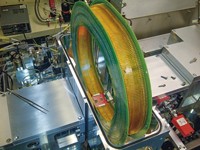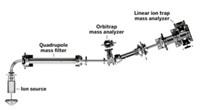Advertisement
Grab your lab coat. Let's get started
Welcome!
Welcome!
Create an account below to get 6 C&EN articles per month, receive newsletters and more - all free.
It seems this is your first time logging in online. Please enter the following information to continue.
As an ACS member you automatically get access to this site. All we need is few more details to create your reading experience.
Not you? Sign in with a different account.
Not you? Sign in with a different account.
ERROR 1
ERROR 1
ERROR 2
ERROR 2
ERROR 2
ERROR 2
ERROR 2
Password and Confirm password must match.
If you have an ACS member number, please enter it here so we can link this account to your membership. (optional)
ERROR 2
ACS values your privacy. By submitting your information, you are gaining access to C&EN and subscribing to our weekly newsletter. We use the information you provide to make your reading experience better, and we will never sell your data to third party members.
Analytical Chemistry
Inside Instrumentation
Technology and Business News for the Laboratory World
by Celia M. Henry and Ann M. Thayer
December 12, 2005
| A version of this story appeared in
Volume 83, Issue 50
Thermo opens a facility in Mumbai ...
Thermo Electron has opened a demonstration and training center in Mumbai, India, to serve regional customers in a variety of industries. The new center provides hands-on access to ion-trap and triple-quadrupole mass spectrometers, centrifuges, incubators, and microplate instruments for laboratory and life sciences research, along with several process instruments. "India and the surrounding regions represent a major market for laboratory and process instrumentation and, therefore, a tremendous opportunity for long-term growth and expansion for Thermo," says company President and CEO Marijn E. Dekkers.
... as Nikon plans a center in California
Nikon Instruments has joined with the California Institute for Quantitative Biomedical Research (QB3) and the University of California, San Francisco, to create a new center to promote education and innovation in microscopy. Nikon and its local dealer, Technical Instruments, have endowed the center with microscopy and imaging equipment. The Nikon Imaging Center (NIC) will be located at UCSF's Mission Bay Campus Center for Advanced Technology in Genentech Hall (at right in photo), next door to QB3's recently completed headquarters building (at left). Open to the university's faculty and staff and to collaborative researchers, NIC will provide opportunities for developing new microscopy technologies, software, analytic techniques, and imaging methods. Nikon has opened similar centers at Harvard University; the University of Heidelberg, in Germany; and Hokkaido University, in Japan.
Two companies make acquisitions
Varian has acquired PL International and its Polymer Laboratories subsidiary for about $42 million. The deal could include additional payments totaling up to $23 million over three years if the business meets certain targets. Polymer Laboratories develops polymer-based consumables and instrumentation for polymer separation and analysis and for high-throughput screening and process monitoring applied to polymeric materials. Polymer Laboratories had revenues of about $22 million for the 12 months ending on Sept. 30. Meanwhile, Agilent Technologies has purchased privately held Molecular Imaging, a developer of nanotechnology measurement tools. Financial details were not disclosed. Based in Tempe, Ariz., Molecular Imaging makes atomic force and scanning probe microscopes for high-resolution imaging in fluids or ambient air under controlled temperatures and conditions.
Cornucopia Of Chromatography Products

A variety of chromatography products ranging from columns and detectors to complete systems have been unveiled recently.
Both ZirChrom Separations and Phenomenex have introduced column-related technologies. ZirChrom's five new stationary phases for chiral separations combine the chemical and mechanical stability of zirconia with the flexibility of Lewis acid and base chiral selectors for both preparative and analytical-scale separations.
Phenomenex's AXIA uses a technology known as Hydraulic Piston Compression for column packing to solve problems regularly faced in preparative chromatography with short columns. The technology avoids collapse of the support bed after packing, which can cause premature column failure. In addition, AXIA addresses variable bed density, low efficiency, and peak asymmetry. The ideal bed density is calculated for each support, chemistry, and column size, and the entire process is computer controlled. AXIA-packed columns are available with Phenomenex's Luna and Gemini chemistries.
On the detector side, Waters has expanded its line of detectors for the Acquity Ultra Performance LC system, an ultra-high-pressure chromatography system. The new detectors include a photodiode array (PDA), a tunable UV-Vis detector, and an evaporative light-scattering (ELS) detector. The PDA has an extended linear dynamic range that allows quantification of lower concentrations. The ELS detector is designed for analytes with little UV response and that don't ionize well for mass spectrometry.
Applied Biosystems and MDS Sciex have debuted the Tempo LC systems for LC mass spectrometry. The product line includes a nanoscale LC system, a multidimensional chromatography system, a high-throughput system for microflow applications, and a spotting system for MALDI MS. The systems feature ultralow dead volumes, fewer moving parts than in conventional LC systems, and a direct pumping mechanism with flow-rate feedback for each mobile phase. The systems are designed for proteomics, biomarker, and drug discovery studies.
Inside Instrumentation is written by





Join the conversation
Contact the reporter
Submit a Letter to the Editor for publication
Engage with us on Twitter